
In recognition of Pride Month, we’re offering several resources that are intended to help educate on topics related to equality. The resources listed today are available as eBooks, and additional print materials can be found on our Campus Conversations Subject Guide on Sexual Orientation.
Law and the Gay Rights Story: The Long Search for Equal Justice in a Divided Democracy
by Walter Frank
 Walter Frank offers an in-depth look at the court cases that were pivotal in establishing gay rights. But he also tells the story of those individuals who were willing to make waves by fighting for those rights, taking enormous personal risks at a time when the tide of public opinion was against them. Frank’s accessible style brings complex legal issues down to earth but, as a former litigator, never loses sight of the law’s human dimension and the context of the events occurring outside the courtroom … Comprehensive in coverage, the book explains the legal and constitutional issues involved in each of the major goals of the gay rights movement: a safe and healthy school environment, workplace equality, an end to anti-gay violence, relationship recognition, and full integration into all the institutions of the larger society, including marriage and military service. Drawing from extensive archival research and from decades of experience as a practicing litigator, Frank not only provides a vivid history, but also shows where the battle for gay rights might go from here.
Walter Frank offers an in-depth look at the court cases that were pivotal in establishing gay rights. But he also tells the story of those individuals who were willing to make waves by fighting for those rights, taking enormous personal risks at a time when the tide of public opinion was against them. Frank’s accessible style brings complex legal issues down to earth but, as a former litigator, never loses sight of the law’s human dimension and the context of the events occurring outside the courtroom … Comprehensive in coverage, the book explains the legal and constitutional issues involved in each of the major goals of the gay rights movement: a safe and healthy school environment, workplace equality, an end to anti-gay violence, relationship recognition, and full integration into all the institutions of the larger society, including marriage and military service. Drawing from extensive archival research and from decades of experience as a practicing litigator, Frank not only provides a vivid history, but also shows where the battle for gay rights might go from here.
eBook Link
Sexual Orientation: Perceptions, Discrimination and Acceptance
Frances Earley
 This book reviews research studies on the perceptions, discrimination and acceptance based on sexual orientation. The first chapter begins with an overview of social reaction, etiological perceptions and spiritual perspectives in LGBTQ Mormons. Chapter Two studies an attempt to integrate theoretical models and provides a review of the empirical evidence of impression formation of applicants differing in sexual orientation. Chapter Three compares the mental health of those who live in neighborhoods with relatively high concentrations of sexual minorities to that of those who live in neighborhoods with relatively low concentrations. Chapter Four tests the initiation of a self-regulatory cycle for avoidance of future homonegative behavior.
This book reviews research studies on the perceptions, discrimination and acceptance based on sexual orientation. The first chapter begins with an overview of social reaction, etiological perceptions and spiritual perspectives in LGBTQ Mormons. Chapter Two studies an attempt to integrate theoretical models and provides a review of the empirical evidence of impression formation of applicants differing in sexual orientation. Chapter Three compares the mental health of those who live in neighborhoods with relatively high concentrations of sexual minorities to that of those who live in neighborhoods with relatively low concentrations. Chapter Four tests the initiation of a self-regulatory cycle for avoidance of future homonegative behavior.
eBook Link
The Lesbian and Gay Movements : Assimilation or Liberation?
by Craig A. Rimmerman
 Throughout their relatively short history, lesbian and gay movements in the United States have endured searing conflicts over whether to embrace assimilationist or liberationist strategies. The Lesbian and Gay Movements explores this dilemma in both contemporary and historical contexts. Rimmerman tackles the challenging issue of what constitutes movement “effectiveness” and how “effective” the assimilationist and liberationist strategies have been in three contentious policy arenas: the military ban, same-sex marriage, and AIDS. Since the first edition in 2007, the landscape of lesbian and gay movements and rights has seen enormous changes. The thoroughly revised second edition includes updated discussion of LGBT movements’ undertakings in, as well the Obama administration’s response to, HIV/AIDS policy, the fight to legalize same-sex marriage and overturn the Defense of Marriage Act, and the repeal of “Don’t Ask, Don’t Tell.”
Throughout their relatively short history, lesbian and gay movements in the United States have endured searing conflicts over whether to embrace assimilationist or liberationist strategies. The Lesbian and Gay Movements explores this dilemma in both contemporary and historical contexts. Rimmerman tackles the challenging issue of what constitutes movement “effectiveness” and how “effective” the assimilationist and liberationist strategies have been in three contentious policy arenas: the military ban, same-sex marriage, and AIDS. Since the first edition in 2007, the landscape of lesbian and gay movements and rights has seen enormous changes. The thoroughly revised second edition includes updated discussion of LGBT movements’ undertakings in, as well the Obama administration’s response to, HIV/AIDS policy, the fight to legalize same-sex marriage and overturn the Defense of Marriage Act, and the repeal of “Don’t Ask, Don’t Tell.”
eBook Link
Queering Education in the Deep South
by Kamden K. Strunk
 This volume explores education in the Deep South, with a focus on LGBTQ students and educators, and on queer theoretical perspectives in education. The topics in this volume include teaching LGBTQ issues and queer studies in the Deep South, educational policy and practice in the Deep South as related to queer issues, and efforts to introduce queer literature to libraries and queer collections to archives. Authors in this volume examine what realities exist in education in the U.S. South currently, and what possibilities might be imagined in the future.
This volume explores education in the Deep South, with a focus on LGBTQ students and educators, and on queer theoretical perspectives in education. The topics in this volume include teaching LGBTQ issues and queer studies in the Deep South, educational policy and practice in the Deep South as related to queer issues, and efforts to introduce queer literature to libraries and queer collections to archives. Authors in this volume examine what realities exist in education in the U.S. South currently, and what possibilities might be imagined in the future.
eBook Link

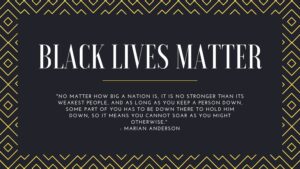
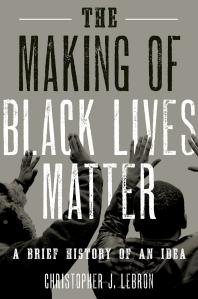 Started in the wake of George Zimmerman’s 2013 acquittal in the death of Trayvon Martin, the #BlackLivesMatter movement has become a powerful and uncompromising campaign demanding redress for the brutal and unjustified treatment of black bodies by law enforcement in the United States. The movement is only a few years old, but as Christopher J. Lebron argues in this book, the sentiment behind it is not; the plea and demand that “Black Lives Matter” comes out of a much older and richer tradition arguing for the equal dignity — and not just equal rights — of black people. The Making of Black Lives Matter presents a condensed and accessible intellectual history that traces the genesis of the ideas that have built into the #BlackLivesMatter movement. Drawing on the work of revolutionary black public intellectuals, including Frederick Douglass, Ida B. Wells, Langston Hughes, Zora Neal Hurston, Anna Julia Cooper, Audre Lorde, James Baldwin, and Martin Luther King Jr., Lebron clarifies what it means to assert that “Black Lives Matter” when faced with contemporary instances of anti-black law enforcement. He also illuminates the crucial difference between the problem signaled by the social media hashtag and how we think that we ought to address the problem.
Started in the wake of George Zimmerman’s 2013 acquittal in the death of Trayvon Martin, the #BlackLivesMatter movement has become a powerful and uncompromising campaign demanding redress for the brutal and unjustified treatment of black bodies by law enforcement in the United States. The movement is only a few years old, but as Christopher J. Lebron argues in this book, the sentiment behind it is not; the plea and demand that “Black Lives Matter” comes out of a much older and richer tradition arguing for the equal dignity — and not just equal rights — of black people. The Making of Black Lives Matter presents a condensed and accessible intellectual history that traces the genesis of the ideas that have built into the #BlackLivesMatter movement. Drawing on the work of revolutionary black public intellectuals, including Frederick Douglass, Ida B. Wells, Langston Hughes, Zora Neal Hurston, Anna Julia Cooper, Audre Lorde, James Baldwin, and Martin Luther King Jr., Lebron clarifies what it means to assert that “Black Lives Matter” when faced with contemporary instances of anti-black law enforcement. He also illuminates the crucial difference between the problem signaled by the social media hashtag and how we think that we ought to address the problem.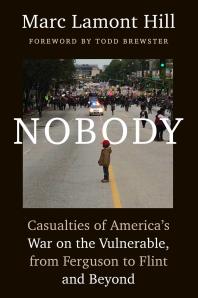 In this ‘thought-provoking and important’ (Library Journal) analysis of state-sanctioned violence, Marc Lamont Hill carefully considers a string of high-profile deaths in America–Sandra Bland, Freddie Gray, Michael Brown, Eric Garner, Trayvon Martin, and others–and incidents of gross negligence by government, such as the water crisis in Flint, Michigan. He digs underneath these events to uncover patterns and policies of authority that allow some citizens become disempowered, disenfranchised, poor, uneducated, exploited, vulnerable, and disposable. To help us understand the plight of vulnerable communities, he examines the effects of unfettered capitalism, mass incarceration, and political power while urging us to consider a new world in which everyone has a chance to become somebody. Heralded as an essential text for our times, Marc Lamont Hill’s galvanizing work embodies the best traditions of scholarship, journalism, and storytelling to lift unheard voices and to address the necessary question, ‘how did we get here?’
In this ‘thought-provoking and important’ (Library Journal) analysis of state-sanctioned violence, Marc Lamont Hill carefully considers a string of high-profile deaths in America–Sandra Bland, Freddie Gray, Michael Brown, Eric Garner, Trayvon Martin, and others–and incidents of gross negligence by government, such as the water crisis in Flint, Michigan. He digs underneath these events to uncover patterns and policies of authority that allow some citizens become disempowered, disenfranchised, poor, uneducated, exploited, vulnerable, and disposable. To help us understand the plight of vulnerable communities, he examines the effects of unfettered capitalism, mass incarceration, and political power while urging us to consider a new world in which everyone has a chance to become somebody. Heralded as an essential text for our times, Marc Lamont Hill’s galvanizing work embodies the best traditions of scholarship, journalism, and storytelling to lift unheard voices and to address the necessary question, ‘how did we get here?’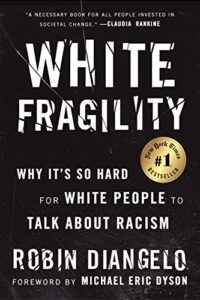 In this groundbreaking and timely book, antiracist educator Robin DiAngelo deftly illuminates the phenomenon of white fragility. Referring to the defensive moves that white people make when challenged racially, white fragility is characterized by emotions such as anger, fear, and guilt, and by behaviors including argumentation and silence. These behaviors, in turn, function to reinstate white racial equilibrium and prevent any meaningful cross-racial dialogue. In this in-depth exploration, DiAngelo explores how white fragility develops, how it protects racial inequality, and what we can do to engage more constructively.
In this groundbreaking and timely book, antiracist educator Robin DiAngelo deftly illuminates the phenomenon of white fragility. Referring to the defensive moves that white people make when challenged racially, white fragility is characterized by emotions such as anger, fear, and guilt, and by behaviors including argumentation and silence. These behaviors, in turn, function to reinstate white racial equilibrium and prevent any meaningful cross-racial dialogue. In this in-depth exploration, DiAngelo explores how white fragility develops, how it protects racial inequality, and what we can do to engage more constructively.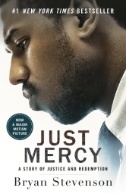 ryan Stevenson was a young lawyer when he founded the Equal Justice Initiative, a legal practice dedicated to defending those most desperate and in need: the poor, the wrongly condemned, and women and children trapped in the farthest reaches of our criminal justice system. One of his first cases was that of Walter McMillian, a young man who was sentenced to die for a notorious murder he insisted he didn’t commit. The case drew Bryan into a tangle of conspiracy, political machination, and legal brinksmanship—and transformed his understanding of mercy and justice forever. Just Mercy is at once an unforgettable account of an idealistic, gifted young lawyer’s coming of age, a moving window into the lives of those he has defended, and an inspiring argument for compassion in the pursuit of true justice.
ryan Stevenson was a young lawyer when he founded the Equal Justice Initiative, a legal practice dedicated to defending those most desperate and in need: the poor, the wrongly condemned, and women and children trapped in the farthest reaches of our criminal justice system. One of his first cases was that of Walter McMillian, a young man who was sentenced to die for a notorious murder he insisted he didn’t commit. The case drew Bryan into a tangle of conspiracy, political machination, and legal brinksmanship—and transformed his understanding of mercy and justice forever. Just Mercy is at once an unforgettable account of an idealistic, gifted young lawyer’s coming of age, a moving window into the lives of those he has defended, and an inspiring argument for compassion in the pursuit of true justice.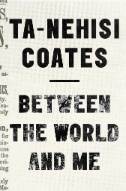 Ta-Nehisi Coates offers a framework for understanding our nation’s history and current crisis. Americans have built an empire on the idea of “race,” a falsehood that damages us all but falls most heavily on the bodies of black women and men — bodies exploited through slavery and segregation, and, today, threatened, locked up, and murdered out of all proportion. What is it like to inhabit a black body and find a way to live within it? And how can we all honestly reckon with this fraught history and free ourselves from its burden? Between the World and Me is Coates’s attempt to answer these questions in a letter to his adolescent son. Coates shares with his son — and readers — the story of his awakening to the truth about his place in the world through a series of revelatory experiences, from Howard University to Civil War battlefields, from the South Side of Chicago to Paris, from his childhood home to the living rooms of mothers whose children’s lives were taken as American plunder.
Ta-Nehisi Coates offers a framework for understanding our nation’s history and current crisis. Americans have built an empire on the idea of “race,” a falsehood that damages us all but falls most heavily on the bodies of black women and men — bodies exploited through slavery and segregation, and, today, threatened, locked up, and murdered out of all proportion. What is it like to inhabit a black body and find a way to live within it? And how can we all honestly reckon with this fraught history and free ourselves from its burden? Between the World and Me is Coates’s attempt to answer these questions in a letter to his adolescent son. Coates shares with his son — and readers — the story of his awakening to the truth about his place in the world through a series of revelatory experiences, from Howard University to Civil War battlefields, from the South Side of Chicago to Paris, from his childhood home to the living rooms of mothers whose children’s lives were taken as American plunder. Nike founder and board chairman Phil Knight “offers a rare and revealing look at the notoriously media-shy man behind the swoosh” (Booklist, starred review), opening up about how he went from being a track star at an Oregon high school to the founder of a brand and company that changed everything. You must forget your limits. It was only when Nike founder Phil Knight got cut from the baseball team as a high school freshman that his mother suggested he try out for track instead. Knight made the track team and he found he could run fast and even more he liked it. Ten years later, young and searching, Knight borrowed fifty dollars from his father and launched a company with one simple mission: import high quality running shoes from Japan. Selling the shoes from the trunk of his car to start, he and his gang of friends and runners built one of the most successful brands ever. Phil Knight encountered risks and setbacks along the way, but always followed his own advice. Just keep going. Don’t stop. Whatever comes up, don’t stop. Filled with wisdom, humanity, humor, and heart, the young readers edition of the bestselling Shoe Dog is a story of determination that inspires all who read it.
Nike founder and board chairman Phil Knight “offers a rare and revealing look at the notoriously media-shy man behind the swoosh” (Booklist, starred review), opening up about how he went from being a track star at an Oregon high school to the founder of a brand and company that changed everything. You must forget your limits. It was only when Nike founder Phil Knight got cut from the baseball team as a high school freshman that his mother suggested he try out for track instead. Knight made the track team and he found he could run fast and even more he liked it. Ten years later, young and searching, Knight borrowed fifty dollars from his father and launched a company with one simple mission: import high quality running shoes from Japan. Selling the shoes from the trunk of his car to start, he and his gang of friends and runners built one of the most successful brands ever. Phil Knight encountered risks and setbacks along the way, but always followed his own advice. Just keep going. Don’t stop. Whatever comes up, don’t stop. Filled with wisdom, humanity, humor, and heart, the young readers edition of the bestselling Shoe Dog is a story of determination that inspires all who read it.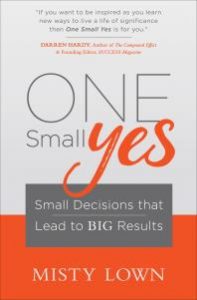 Misty … is literally the Steve Jobs of the dance world, and the steps she’s taken to build her business apply to any business owner out there” (Cody Foster, CEO, Advisors Excel). It’s the small decisions that lead to big results. People were born to live a life of significance. But busyness and fear of failure can overwhelm and get in the way. Now Misty Lown-founder of More Than Just Great Dancing and MoreThanDancers.com-shares her secrets for following your passion toward success. One Small Yes was written for people who want to make an impact, but are not sure where to start. One Small Yes is for you if you have ever wondered: “What am I here for?” “What is my calling?” “Can I follow my calling without losing my family or my sanity?” If what I see in my mind is possible, how on earth can I get it all done’ Forget about complicated calendars or excessive goal setting exercises. Following your calling is about moving forward, one small yes decision at a time. No matter the size of your dream or the difference you feel called to make, your journey starts with One Small Yes. If you want to build a life and a business that makes a difference, Misty Lown will show you the way. What she has accomplished one ‘yes’ at time is an inspiration to entrepreneurs everywhere.
Misty … is literally the Steve Jobs of the dance world, and the steps she’s taken to build her business apply to any business owner out there” (Cody Foster, CEO, Advisors Excel). It’s the small decisions that lead to big results. People were born to live a life of significance. But busyness and fear of failure can overwhelm and get in the way. Now Misty Lown-founder of More Than Just Great Dancing and MoreThanDancers.com-shares her secrets for following your passion toward success. One Small Yes was written for people who want to make an impact, but are not sure where to start. One Small Yes is for you if you have ever wondered: “What am I here for?” “What is my calling?” “Can I follow my calling without losing my family or my sanity?” If what I see in my mind is possible, how on earth can I get it all done’ Forget about complicated calendars or excessive goal setting exercises. Following your calling is about moving forward, one small yes decision at a time. No matter the size of your dream or the difference you feel called to make, your journey starts with One Small Yes. If you want to build a life and a business that makes a difference, Misty Lown will show you the way. What she has accomplished one ‘yes’ at time is an inspiration to entrepreneurs everywhere.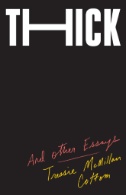
 Sir Walter Ralegh was a favorite of Queen Elizabeth. She showered him with estates and political appointments. He envisioned her becoming empress of a universal empire. She gave him the opportunity to lead the way. In Walter Ralegh, Alan Gallay shows that, while Ralegh may be best known for founding the failed Roanoke colony, his historical importance vastly exceeds that enterprise. Inspired by the mystical religious philosophy of hermeticism, Ralegh led English attempts to colonize in North America, South America, and Ireland. He believed that the answer to English fears of national decline resided overseas — and that colonialism could be achieved without conquest. Gallay reveals how Ralegh launched the English Empire and an era of colonization that shaped Western history for centuries after his death.
Sir Walter Ralegh was a favorite of Queen Elizabeth. She showered him with estates and political appointments. He envisioned her becoming empress of a universal empire. She gave him the opportunity to lead the way. In Walter Ralegh, Alan Gallay shows that, while Ralegh may be best known for founding the failed Roanoke colony, his historical importance vastly exceeds that enterprise. Inspired by the mystical religious philosophy of hermeticism, Ralegh led English attempts to colonize in North America, South America, and Ireland. He believed that the answer to English fears of national decline resided overseas — and that colonialism could be achieved without conquest. Gallay reveals how Ralegh launched the English Empire and an era of colonization that shaped Western history for centuries after his death.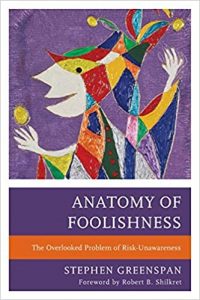 Just days after publishing his first book on the theory of foolishness, Stephen Greenspan learned that he had been hoodwinked by Bernard Madoff’s Ponzi scheme, or more accurately the Madoff “feeder” fund he invested in. Greenspan published a featured essay on the topic in the Wall Street Journal a few weeks later, and that essay was widely cited and attracted great interest for Greenspan’s ideas about gullibility and in the United States and many other countries. Greenspan’s new book, The Anatomy of Foolishness, explains why and how individuals (of all ages and levels of intelligence) and organizations act in ways that undermine their interests and even their continued existence. He examines three types of foolishness, using vivid examples to illustrate each, including the many foolish actions of US President Donald Trump. Greenspan presents a multidimensional theory of foolishness that contributes to the literature on human competence, and this book is likely to attract broad interest in the fields of psychology, sociology, economics, political science, and psychiatry as well as among those members of the general public (basically everyone) who have acted foolishly or know someone who has acted in a way that went against their own interests.
Just days after publishing his first book on the theory of foolishness, Stephen Greenspan learned that he had been hoodwinked by Bernard Madoff’s Ponzi scheme, or more accurately the Madoff “feeder” fund he invested in. Greenspan published a featured essay on the topic in the Wall Street Journal a few weeks later, and that essay was widely cited and attracted great interest for Greenspan’s ideas about gullibility and in the United States and many other countries. Greenspan’s new book, The Anatomy of Foolishness, explains why and how individuals (of all ages and levels of intelligence) and organizations act in ways that undermine their interests and even their continued existence. He examines three types of foolishness, using vivid examples to illustrate each, including the many foolish actions of US President Donald Trump. Greenspan presents a multidimensional theory of foolishness that contributes to the literature on human competence, and this book is likely to attract broad interest in the fields of psychology, sociology, economics, political science, and psychiatry as well as among those members of the general public (basically everyone) who have acted foolishly or know someone who has acted in a way that went against their own interests.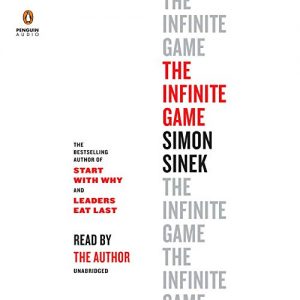 Infinite games, like football or chess, the players are known, the rules are fixed, and the endpoint is clear. The winners and losers are easily identified. In infinite games, like business or politics or life itself, the players come and go, the rules are changeable, and there is no defined endpoint. There are no winners or losers in an infinite game; there is only ahead and behind. The more I started to understand the difference between finite and infinite games, the more I began to see infinite games all around us. I started to see that many of the struggles that organizations face exist simply because their leaders were playing with a finite mindset in an infinite game. These organizations tend to lag behind in innovation, discretionary effort, morale and ultimately performance. The leaders who embrace an infinite mindset, in stark contrast, build stronger, more innovative, more inspiring organizations. Their people trust each other and their leaders. They have the resilience to thrive in an ever-changing world, while their competitors fall by the wayside. Ultimately, they are the ones who lead the rest of us into the future. Any worthwhile undertaking starts with Why — the purpose, cause or belief that inspires us to do what we do and inspires others to join us. Good leaders know how to build Circles of Safety that promote trust and cooperation throughout their organizations. But that’s not enough to help us chart a course through the unpredictable, often chaotic landscape of today’s marketplace. I now believe that the ability to adopt an infinite mindset is a prerequisite for any leader who aspires to leave their organization in better shape than they found it.
Infinite games, like football or chess, the players are known, the rules are fixed, and the endpoint is clear. The winners and losers are easily identified. In infinite games, like business or politics or life itself, the players come and go, the rules are changeable, and there is no defined endpoint. There are no winners or losers in an infinite game; there is only ahead and behind. The more I started to understand the difference between finite and infinite games, the more I began to see infinite games all around us. I started to see that many of the struggles that organizations face exist simply because their leaders were playing with a finite mindset in an infinite game. These organizations tend to lag behind in innovation, discretionary effort, morale and ultimately performance. The leaders who embrace an infinite mindset, in stark contrast, build stronger, more innovative, more inspiring organizations. Their people trust each other and their leaders. They have the resilience to thrive in an ever-changing world, while their competitors fall by the wayside. Ultimately, they are the ones who lead the rest of us into the future. Any worthwhile undertaking starts with Why — the purpose, cause or belief that inspires us to do what we do and inspires others to join us. Good leaders know how to build Circles of Safety that promote trust and cooperation throughout their organizations. But that’s not enough to help us chart a course through the unpredictable, often chaotic landscape of today’s marketplace. I now believe that the ability to adopt an infinite mindset is a prerequisite for any leader who aspires to leave their organization in better shape than they found it.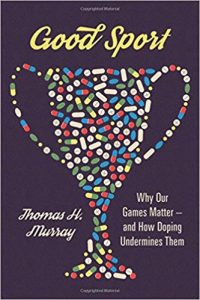 Why are some technologies such as fiberglass vaulting poles and hinged skates accepted in sport while performance-enhancing drugs are forbidden? Yes, performance-enhancing drugs are against the rules, but the people who play and govern sport create those rules; rules can be changed. Should we level the playing field by allowing all competitors to use drugs that allow them to run faster or longer, leap higher, or lift more? In this provocative exploration of what draws us to sport as participants and spectators, Good Sport argues that the values and meanings embedded within our games provide the guidance we need to make difficult decisions about fairness and performance-enhancing technologies. Good Sport reveals what we care about in sport. It describes how the reckless use of biomedical enhancements undermines those values. Implicit in sport’s history, rules and practices are values and meanings that provide a sturdy foundation for an ethics of sport that celebrates natural talents and dedication. The way a sport adapts to innovations in equipment, tactics and players makes visible its values and meanings. Performance-enhancing drugs distort the connection between natural talents, the dedication to perfect those talents, and success in sport. Through understanding the fundamental role of values and meanings, we can see not just what we champion in the athletic arena but more broadly what we value in human achievement.
Why are some technologies such as fiberglass vaulting poles and hinged skates accepted in sport while performance-enhancing drugs are forbidden? Yes, performance-enhancing drugs are against the rules, but the people who play and govern sport create those rules; rules can be changed. Should we level the playing field by allowing all competitors to use drugs that allow them to run faster or longer, leap higher, or lift more? In this provocative exploration of what draws us to sport as participants and spectators, Good Sport argues that the values and meanings embedded within our games provide the guidance we need to make difficult decisions about fairness and performance-enhancing technologies. Good Sport reveals what we care about in sport. It describes how the reckless use of biomedical enhancements undermines those values. Implicit in sport’s history, rules and practices are values and meanings that provide a sturdy foundation for an ethics of sport that celebrates natural talents and dedication. The way a sport adapts to innovations in equipment, tactics and players makes visible its values and meanings. Performance-enhancing drugs distort the connection between natural talents, the dedication to perfect those talents, and success in sport. Through understanding the fundamental role of values and meanings, we can see not just what we champion in the athletic arena but more broadly what we value in human achievement. Conceived as the most modern, humane incarceration facility the world had ever seen, New York’s Blackwell’s Island, site of a lunatic asylum, two prisons, an almshouse, and a number of hospitals, quickly became, in the words of a visiting Charles Dickens, “a lounging, listless madhouse.” Digging through city records, newspaper articles, and archival reports, Stacy Horn tells a gripping narrative through the voices of the island’s inhabitants. We also hear from the era’s officials, reformers, and journalists, including the celebrated undercover reporter Nellie Bly. And we follow the extraordinary Reverend William Glenney French as he ministers to Blackwell’s residents, battles the bureaucratic mazes of the Department of Correction and a corrupt City Hall, testifies at salacious trials, and in his diary wonders about man’s inhumanity to his fellow man. Damnation Island shows how far we’ve come in caring for the least fortunate among us—and reminds us how much work still remains.
Conceived as the most modern, humane incarceration facility the world had ever seen, New York’s Blackwell’s Island, site of a lunatic asylum, two prisons, an almshouse, and a number of hospitals, quickly became, in the words of a visiting Charles Dickens, “a lounging, listless madhouse.” Digging through city records, newspaper articles, and archival reports, Stacy Horn tells a gripping narrative through the voices of the island’s inhabitants. We also hear from the era’s officials, reformers, and journalists, including the celebrated undercover reporter Nellie Bly. And we follow the extraordinary Reverend William Glenney French as he ministers to Blackwell’s residents, battles the bureaucratic mazes of the Department of Correction and a corrupt City Hall, testifies at salacious trials, and in his diary wonders about man’s inhumanity to his fellow man. Damnation Island shows how far we’ve come in caring for the least fortunate among us—and reminds us how much work still remains.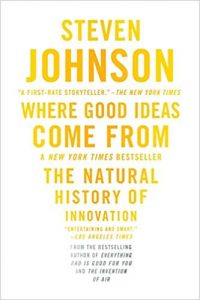 The printing press, the pencil, the flush toilet, the battery–these are all great ideas. But where do they come from? What kind of environment breeds them? What sparks the flash of brilliance? How do we generate the breakthrough technologies that push forward our lives, our society, our culture? Steven Johnson’s answers are revelatory as he identifies the seven key patterns behind genuine innovation, and traces them across time and disciplines. From Darwin and Freud to the halls of Google and Apple, Johnson investigates the innovation hubs throughout modern time and pulls out the approaches and commonalities that seem to appear at moments of originality.
The printing press, the pencil, the flush toilet, the battery–these are all great ideas. But where do they come from? What kind of environment breeds them? What sparks the flash of brilliance? How do we generate the breakthrough technologies that push forward our lives, our society, our culture? Steven Johnson’s answers are revelatory as he identifies the seven key patterns behind genuine innovation, and traces them across time and disciplines. From Darwin and Freud to the halls of Google and Apple, Johnson investigates the innovation hubs throughout modern time and pulls out the approaches and commonalities that seem to appear at moments of originality.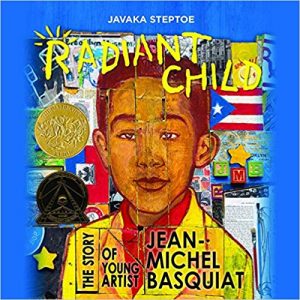 2017 Coretta Scott King Illustrator Award Winner
2017 Coretta Scott King Illustrator Award Winner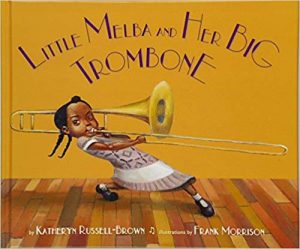 2015 Coretta Scott King Illustrator Honor Book
2015 Coretta Scott King Illustrator Honor Book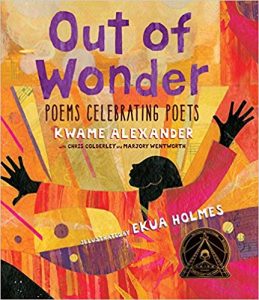 2018 Coretta Scott King Illustrator Award Winner
2018 Coretta Scott King Illustrator Award Winner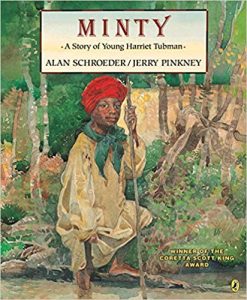 1997 Coretta Scott King Illustrator Award Winner
1997 Coretta Scott King Illustrator Award Winner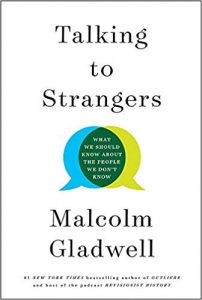 In this thoughtful treatise spurred by the 2015 death of African-American academic Sandra Bland in jail after a traffic stop, New Yorker writer Gladwell (The Tipping Point) aims to figure out the strategies people use to assess strangers-to “analyze, critique them, figure out where they came from, figure out how to fix them,” in other words: to understand how to balance trust and safety. He uses a variety of examples from history and recent headlines to illustrate that people size up the motivations, emotions, and trustworthiness of those they don’t know both wrongly and with misplaced confidence.
In this thoughtful treatise spurred by the 2015 death of African-American academic Sandra Bland in jail after a traffic stop, New Yorker writer Gladwell (The Tipping Point) aims to figure out the strategies people use to assess strangers-to “analyze, critique them, figure out where they came from, figure out how to fix them,” in other words: to understand how to balance trust and safety. He uses a variety of examples from history and recent headlines to illustrate that people size up the motivations, emotions, and trustworthiness of those they don’t know both wrongly and with misplaced confidence.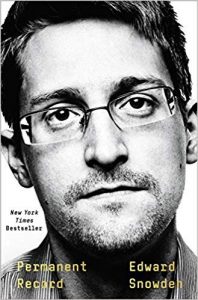 In 2013, twenty-nine-year-old Edward Snowden shocked the world when he broke with the American intelligence establishment and revealed that the United States government was secretly pursuing the means to collect every single phone call, text message, and email. The result would be an unprecedented system of mass surveillance with the ability to pry into the private lives of every person on earth. Six years later, Snowden reveals how he helped to build this system and why he was moved to expose it. Spanning the bucolic Beltway suburbs of his childhood and the clandestine CIA and NSA postings of his adulthood, Permanent Record is the account of a bright young man who grew up online — a man who became a spy, a whistleblower, and, in exile, the Internet’s conscience.
In 2013, twenty-nine-year-old Edward Snowden shocked the world when he broke with the American intelligence establishment and revealed that the United States government was secretly pursuing the means to collect every single phone call, text message, and email. The result would be an unprecedented system of mass surveillance with the ability to pry into the private lives of every person on earth. Six years later, Snowden reveals how he helped to build this system and why he was moved to expose it. Spanning the bucolic Beltway suburbs of his childhood and the clandestine CIA and NSA postings of his adulthood, Permanent Record is the account of a bright young man who grew up online — a man who became a spy, a whistleblower, and, in exile, the Internet’s conscience. The untold story of the women killed by Jack the Ripper–and a gripping portrait of Victorian London–[this book] changes the narrative of these murders forever. Polly, Annie, Elisabeth, Catherine, and Mary Jane are famous for the same thing, though they never met. They came from some of London’s wealthiest and poorest neighborhoods, from the factory towns of middle England, and from Wales and Sweden. They wrote ballads, ran coffeehouses, lived on country estates; they breathed ink dust from printing presses and escaped human traffickers. What they had in common was the year of their murders: 1888. The person responsible was never identified, but the character created by the press to fill that gap has become far more famous than any of these five women. For more than a century newspapers have been keen to tell us that ‘the Ripper’ preyed on prostitutes. Not only is this untrue, as historian Hallie Rubenhold has discovered, but it has prevented the real stories of these fascinating women from being told. Now, by drawing on a wealth of formerly unseen archival material and adding full historical context to the victims’ lives, Rubenhold finally sets the record straight, revealing a world not just of Dickens and Queen Victoria, but of poverty, homelessness, and rampant misogyny. They died because they were in the wrong place at the wrong time–but their greatest misfortune was to be born women.
The untold story of the women killed by Jack the Ripper–and a gripping portrait of Victorian London–[this book] changes the narrative of these murders forever. Polly, Annie, Elisabeth, Catherine, and Mary Jane are famous for the same thing, though they never met. They came from some of London’s wealthiest and poorest neighborhoods, from the factory towns of middle England, and from Wales and Sweden. They wrote ballads, ran coffeehouses, lived on country estates; they breathed ink dust from printing presses and escaped human traffickers. What they had in common was the year of their murders: 1888. The person responsible was never identified, but the character created by the press to fill that gap has become far more famous than any of these five women. For more than a century newspapers have been keen to tell us that ‘the Ripper’ preyed on prostitutes. Not only is this untrue, as historian Hallie Rubenhold has discovered, but it has prevented the real stories of these fascinating women from being told. Now, by drawing on a wealth of formerly unseen archival material and adding full historical context to the victims’ lives, Rubenhold finally sets the record straight, revealing a world not just of Dickens and Queen Victoria, but of poverty, homelessness, and rampant misogyny. They died because they were in the wrong place at the wrong time–but their greatest misfortune was to be born women.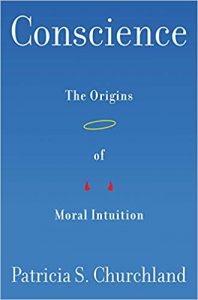 In her brilliant work Touching a Nerve, Patricia S. Churchland, the distinguished founder of neurophilosophy, drew from scientific research on the brain to understand its philosophical and ethical implications for identity, consciousness, free will, and memory. In Conscience, she explores how moral systems arise from our physical selves in combination with environmental demands. All social groups have ideals for behavior, even though ethics vary among different cultures and among individuals within each culture. In trying to understand why, Churchland brings together an understanding of the influences of nature and nurture. She looks to evolution to elucidate how, from birth, our brains are configured to form bonds, to cooperate, and to care. She shows how children grow up in society to learn, through repetition and rewards, the norms, values, and behavior that their parents embrace. Conscience delves into scientific studies, particularly the fascinating work on twins, to deepen our understanding of whether people have a predisposition to embrace specific ethical stands. Research on psychopaths illuminates the knowledge about those who abide by no moral system and the explanations science gives for these disturbing individuals. Churchland then turns to philosophy―that of Socrates, Aquinas, and contemporary thinkers like Owen Flanagan―to explore why morality is central to all societies, how it is transmitted through the generations, and why different cultures live by different morals. Her unparalleled ability to join ideas rarely put into dialogue brings light to a subject that speaks to the meaning of being human.
In her brilliant work Touching a Nerve, Patricia S. Churchland, the distinguished founder of neurophilosophy, drew from scientific research on the brain to understand its philosophical and ethical implications for identity, consciousness, free will, and memory. In Conscience, she explores how moral systems arise from our physical selves in combination with environmental demands. All social groups have ideals for behavior, even though ethics vary among different cultures and among individuals within each culture. In trying to understand why, Churchland brings together an understanding of the influences of nature and nurture. She looks to evolution to elucidate how, from birth, our brains are configured to form bonds, to cooperate, and to care. She shows how children grow up in society to learn, through repetition and rewards, the norms, values, and behavior that their parents embrace. Conscience delves into scientific studies, particularly the fascinating work on twins, to deepen our understanding of whether people have a predisposition to embrace specific ethical stands. Research on psychopaths illuminates the knowledge about those who abide by no moral system and the explanations science gives for these disturbing individuals. Churchland then turns to philosophy―that of Socrates, Aquinas, and contemporary thinkers like Owen Flanagan―to explore why morality is central to all societies, how it is transmitted through the generations, and why different cultures live by different morals. Her unparalleled ability to join ideas rarely put into dialogue brings light to a subject that speaks to the meaning of being human.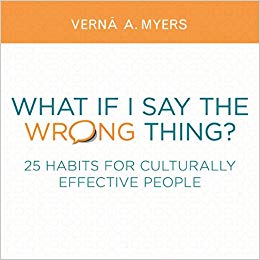 In this compelling new tip book you’ll find innovative and surprising ways to keep your personal diversity journey moving and the diversity commitment of your organization. Written to make this information bite-size and accessible, you’ll find quick answers to typical What should I do? questions, like: What if I say the wrong thing, what should I do? What if I am work and someone makes a sexist joke, what should I say?
In this compelling new tip book you’ll find innovative and surprising ways to keep your personal diversity journey moving and the diversity commitment of your organization. Written to make this information bite-size and accessible, you’ll find quick answers to typical What should I do? questions, like: What if I say the wrong thing, what should I do? What if I am work and someone makes a sexist joke, what should I say?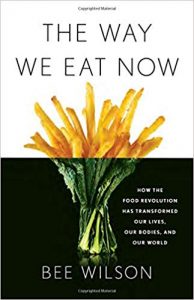 In just two generations, the world has undergone a massive shift from traditional, limited diets to more globalized ways of eating– from bubble tea to quinoa, Soylent to meal kits. Paradoxically, our diets are getting healthier and less healthy at the same time. For some, there has never been a happier food era than today: a time of unusual herbs, farmers’ markets, and internet recipe swaps. Yet modern food also kills– diabetes and heart disease are on the rise everywhere on earth. This is a book about the good, the terrible, and the avocado toast. A riveting exploration of the hidden forces behind what we eat, “The way we eat now” explains how this food revolution has transformed our bodies, our social lives, and the world we live in.
In just two generations, the world has undergone a massive shift from traditional, limited diets to more globalized ways of eating– from bubble tea to quinoa, Soylent to meal kits. Paradoxically, our diets are getting healthier and less healthy at the same time. For some, there has never been a happier food era than today: a time of unusual herbs, farmers’ markets, and internet recipe swaps. Yet modern food also kills– diabetes and heart disease are on the rise everywhere on earth. This is a book about the good, the terrible, and the avocado toast. A riveting exploration of the hidden forces behind what we eat, “The way we eat now” explains how this food revolution has transformed our bodies, our social lives, and the world we live in.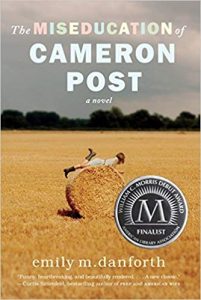 When Cameron Post’s parents die suddenly in a car crash, her shocking first thought is relief. Relief they’ll never know that, hours earlier, she had been kissing a girl. But that relief doesn’t last, and Cam is forced to move in with her conservative aunt Ruth and her well-intentioned but hopelessly old-fashioned grandmother. She knows that from this point on, her life will forever be different. Survival in Miles City, Montana, means blending in and leaving well enough alone, and Cam becomes an expert at both. Then Coley Taylor moves to town. Beautiful, pickup-driving Coley is a perfect cowgirl with the perfect boyfriend to match. She and Cam forge an unexpected and intense friendship, one that seems to leave room for something more to emerge. But just as that starts to seem like a real possibility, Aunt Ruth takes drastic action to “fix” her niece, bringing Cam face-to-face with the cost of denying her true self—even if she’s not quite sure who that is.
When Cameron Post’s parents die suddenly in a car crash, her shocking first thought is relief. Relief they’ll never know that, hours earlier, she had been kissing a girl. But that relief doesn’t last, and Cam is forced to move in with her conservative aunt Ruth and her well-intentioned but hopelessly old-fashioned grandmother. She knows that from this point on, her life will forever be different. Survival in Miles City, Montana, means blending in and leaving well enough alone, and Cam becomes an expert at both. Then Coley Taylor moves to town. Beautiful, pickup-driving Coley is a perfect cowgirl with the perfect boyfriend to match. She and Cam forge an unexpected and intense friendship, one that seems to leave room for something more to emerge. But just as that starts to seem like a real possibility, Aunt Ruth takes drastic action to “fix” her niece, bringing Cam face-to-face with the cost of denying her true self—even if she’s not quite sure who that is.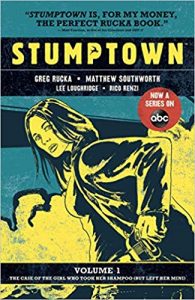 Dex is the proprietor of Stumptown Investigations, and a fairly talented P.I. Unfortunately, she’s less adept at throwing dice than solving cases. Her recent streak has left her beyond broke – she’s into the Confederated Tribes of the Wind Coast for 18 large. But maybe Dex’s luck is about to change. Sue-Lynne, head of the Wind Coast’s casino operation, will clear Dex’s debt if she can locate Sue-Lynne’s missing granddaughter. But is this job Dex’s way out of the hole or a shove down one much much deeper?
Dex is the proprietor of Stumptown Investigations, and a fairly talented P.I. Unfortunately, she’s less adept at throwing dice than solving cases. Her recent streak has left her beyond broke – she’s into the Confederated Tribes of the Wind Coast for 18 large. But maybe Dex’s luck is about to change. Sue-Lynne, head of the Wind Coast’s casino operation, will clear Dex’s debt if she can locate Sue-Lynne’s missing granddaughter. But is this job Dex’s way out of the hole or a shove down one much much deeper? Kiera Johnson is an honors student, a math tutor, and one of the few Black kids at Jefferson Academy. At home she joins hundreds of thousands of Black gamers who duel worldwide as Nubian personas in the secret multiplayer online role-playing card game, SLAY. When a teen in Kansas City is murdered over a dispute in the SLAY world, the game is labeled a racist, exclusionist, violent hub for thugs and criminals. No one knows Kiera is the game developer– until an anonymous troll infiltrates the game, threatening to sue Kiera for “anti-white discrimination.” Can she protect her game without losing herself in the process?
Kiera Johnson is an honors student, a math tutor, and one of the few Black kids at Jefferson Academy. At home she joins hundreds of thousands of Black gamers who duel worldwide as Nubian personas in the secret multiplayer online role-playing card game, SLAY. When a teen in Kansas City is murdered over a dispute in the SLAY world, the game is labeled a racist, exclusionist, violent hub for thugs and criminals. No one knows Kiera is the game developer– until an anonymous troll infiltrates the game, threatening to sue Kiera for “anti-white discrimination.” Can she protect her game without losing herself in the process?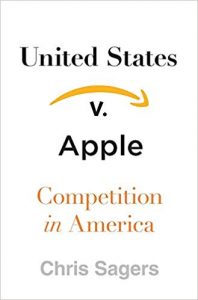 One of the most followed antitrust cases of recent times–United States v. Apple–reveals a missed truth: what Americans most fear is competition itself. In 2012 the Department of Justice accused Apple and five book publishers of conspiring to fix e-book prices. The evidence overwhelmingly showed an unadorned price-fixing conspiracy that cost consumers hundreds of millions of dollars. Yet before, during, and after the trial millions of Americans sided with the defendants. Pundits on the left and right condemned the government for its decision to sue, decrying Amazon’s market share, railing against a new high-tech economy, and rallying to defend beloved authors and publishers. For many, Amazon was the one that should have been put on trial. But why? One fact went unrecognized and unreckoned with: in practice, Americans have long been ambivalent about competition. Chris Sagers, a renowned antitrust expert, meticulously pulls apart the misunderstandings and exaggerations that industries as diverse as mom-and-pop grocers and producers of cast-iron sewer pipes have cited to justify colluding to forestall competition.
One of the most followed antitrust cases of recent times–United States v. Apple–reveals a missed truth: what Americans most fear is competition itself. In 2012 the Department of Justice accused Apple and five book publishers of conspiring to fix e-book prices. The evidence overwhelmingly showed an unadorned price-fixing conspiracy that cost consumers hundreds of millions of dollars. Yet before, during, and after the trial millions of Americans sided with the defendants. Pundits on the left and right condemned the government for its decision to sue, decrying Amazon’s market share, railing against a new high-tech economy, and rallying to defend beloved authors and publishers. For many, Amazon was the one that should have been put on trial. But why? One fact went unrecognized and unreckoned with: in practice, Americans have long been ambivalent about competition. Chris Sagers, a renowned antitrust expert, meticulously pulls apart the misunderstandings and exaggerations that industries as diverse as mom-and-pop grocers and producers of cast-iron sewer pipes have cited to justify colluding to forestall competition.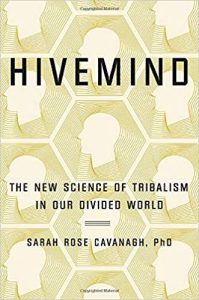 Hivemind: A collective consciousness in which we share consensus thoughts, emotions, and opinions; a phenomenon whereby a group of people function as if with a single mind. Our views of the world are shaped by the stories told by our self-selected communities. Whether seeking out groups that share our tastes, our faith, our heritage, or other interests, since the dawn of time we have taken comfort in defining ourselves through our social groups. But what happens when we only socialize with our chosen group, to the point that we lose the ability to connect to people who don’t share our passions? What happens when our tribes merely confirm our world view, rather than expand it? The advent of social media and smartphones has amplified these tendencies in ways that spell both promise and peril. Our hive-ish natures benefit us in countless ways–combating the mental and physical costs of loneliness, connecting us with collaborators and supporters, and exposing us to entertainment and information beyond what we can find in our literal backyards. But of course, there are also looming risks–echo chambers, political polarization, and conspiracy theories that have already begun to have deadly consequences. Leading a narrative journey from the site of the Charlottesville riots to the boardrooms of Facebook, considering such diverse topics as zombies, neuroscience, and honeybees, psychologist and emotion regulation specialist Sarah Rose Cavanagh leaves no stone unturned in her quest to understand how social technology is reshaping the way we socialize. It’s not possible to turn back the clocks, and Cavanagh argues that there’s no need to; instead, she presents a fully examined and thoughtful call to cut through our online tribalism, dial back our moral panic about screens and mental health, and shore up our sense of community.
Hivemind: A collective consciousness in which we share consensus thoughts, emotions, and opinions; a phenomenon whereby a group of people function as if with a single mind. Our views of the world are shaped by the stories told by our self-selected communities. Whether seeking out groups that share our tastes, our faith, our heritage, or other interests, since the dawn of time we have taken comfort in defining ourselves through our social groups. But what happens when we only socialize with our chosen group, to the point that we lose the ability to connect to people who don’t share our passions? What happens when our tribes merely confirm our world view, rather than expand it? The advent of social media and smartphones has amplified these tendencies in ways that spell both promise and peril. Our hive-ish natures benefit us in countless ways–combating the mental and physical costs of loneliness, connecting us with collaborators and supporters, and exposing us to entertainment and information beyond what we can find in our literal backyards. But of course, there are also looming risks–echo chambers, political polarization, and conspiracy theories that have already begun to have deadly consequences. Leading a narrative journey from the site of the Charlottesville riots to the boardrooms of Facebook, considering such diverse topics as zombies, neuroscience, and honeybees, psychologist and emotion regulation specialist Sarah Rose Cavanagh leaves no stone unturned in her quest to understand how social technology is reshaping the way we socialize. It’s not possible to turn back the clocks, and Cavanagh argues that there’s no need to; instead, she presents a fully examined and thoughtful call to cut through our online tribalism, dial back our moral panic about screens and mental health, and shore up our sense of community.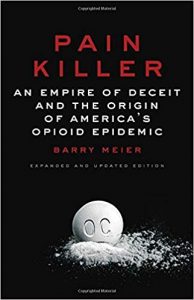 Between 1999 and 2017, an estimated 250,000 Americans died from overdoses involving prescription painkillers, a plague ignited by the aggressive marketing of OxyContin by its maker, Purdue Pharma. Purdue, owned by a wealthy and secretive family–the Sacklers–knew early on that teenagers and others were abusing its billion dollar “wonder” drug. But Justice Department officials balked a decade ago when it came to meting out justice, allowing an opioid crisis to evolve into a catastrophe. Originally published in 2003 and hailed since as groundbreaking, Meier–in this thoroughly updated edition–reveals new and shocking information about how long the drug maker knew about OxyContin’s abuse, even as it marketed it aggressively, and the way government officials passed up opportunities to protect hundreds of thousands of lives. Equal parts crime thriller, medical detective story, and business expos, ̌ Pain Killer is the origin story of the opioid crisis, a hard-hitting look at how a supposed wonder drug became the gateway drug to a national tragedy.
Between 1999 and 2017, an estimated 250,000 Americans died from overdoses involving prescription painkillers, a plague ignited by the aggressive marketing of OxyContin by its maker, Purdue Pharma. Purdue, owned by a wealthy and secretive family–the Sacklers–knew early on that teenagers and others were abusing its billion dollar “wonder” drug. But Justice Department officials balked a decade ago when it came to meting out justice, allowing an opioid crisis to evolve into a catastrophe. Originally published in 2003 and hailed since as groundbreaking, Meier–in this thoroughly updated edition–reveals new and shocking information about how long the drug maker knew about OxyContin’s abuse, even as it marketed it aggressively, and the way government officials passed up opportunities to protect hundreds of thousands of lives. Equal parts crime thriller, medical detective story, and business expos, ̌ Pain Killer is the origin story of the opioid crisis, a hard-hitting look at how a supposed wonder drug became the gateway drug to a national tragedy.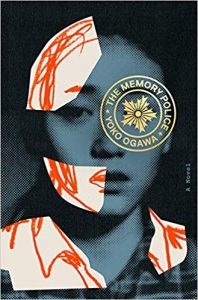 On an unnamed island off an unnamed coast, objects are disappearing: first hats, then ribbons, birds, roses–until things become much more serious. Most of the island’s inhabitants are oblivious to these changes, while those few imbued with the power to recall the lost objects live in fear of the draconian Memory Police, who are committed to ensuring that what has disappeared remains forgotten. When a young woman who is struggling to maintain her career as a novelist discovers that her editor is in danger from the Memory Police, she concocts a plan to hide him beneath her floorboards. As fear and loss close in around them, they cling to her writing as the last way of preserving the past. A surreal, provocative fable about the power of memory and the trauma of loss, The Memory Police is a stunning new work from one of the most exciting contemporary authors writing in any language.
On an unnamed island off an unnamed coast, objects are disappearing: first hats, then ribbons, birds, roses–until things become much more serious. Most of the island’s inhabitants are oblivious to these changes, while those few imbued with the power to recall the lost objects live in fear of the draconian Memory Police, who are committed to ensuring that what has disappeared remains forgotten. When a young woman who is struggling to maintain her career as a novelist discovers that her editor is in danger from the Memory Police, she concocts a plan to hide him beneath her floorboards. As fear and loss close in around them, they cling to her writing as the last way of preserving the past. A surreal, provocative fable about the power of memory and the trauma of loss, The Memory Police is a stunning new work from one of the most exciting contemporary authors writing in any language.